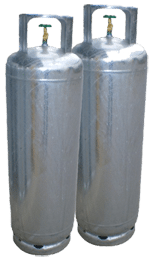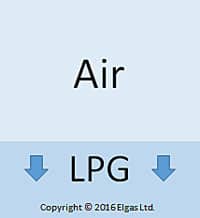Gas Bottle Storage Requirements – Gas Cylinder Storage Requirements – Liquid Propane Storage
Safe gas bottle storage (gas cylinder storage) is important to you, your home and your family. Australian gas bottle storage requirements (gas cylinder storage requirements) and standards specify the ways gas bottles-cylinders should be stored and maintained for LPG tank safety.
LPG gas storage is in pressure vessels and it is almost always stored in its liquid form.
These gas bottle storage (gas cylinder storage) can range from small camping canisters to BBQ gas cylinders to larger gas cylinders and much larger LPG gas storage in Propane tanks – bullets.
LPG gas storage depots may consist of large LPG gas storage spheres or large buried tanks.
The liquefied propane storage can also be underground, in custom-built or prepared storage caverns.
Here are some important aspects of gas bottle storage requirements (gas cylinder storage requirements) and LPG tank safety…
Safe Gas Bottle Storage Requirements and General Guidelines
Including Forklift Gas Bottle Storage Requirements
These gas bottle storage requirements apply to all gas bottles, including the forklift gas bottle storage requirements.
- Safe gas bottle storage (gas cylinder storage) is practiced by storing the cylinder outdoors in a well ventilated area.
 LPG gas cylinder storage must always be upright with valves closed, when not in use. The exception is the forklift gas bottle storage requirements, where horizontal storage is required.
LPG gas cylinder storage must always be upright with valves closed, when not in use. The exception is the forklift gas bottle storage requirements, where horizontal storage is required.- Propane gas cylinders must be prevented from falling and protected from impact and damage for LPG tank safety.
- LPG gas storage requirements (gas bottle storage requirements) place limits on LPG gas cylinder storage quantities that may apply and placarding may be required.
- The propane gas cylinder storage should always kept away from high traffic areas to minimise any chance of accidental impacts.
- To ensure safe gas bottle storage (gas cylinder storage), indoor cylinder placement should always be avoided.
- The LPG-propane gas bottle storage (gas cylinder storage) area should be flat and firm, such as a concrete slab and be in a location with good drainage, as propane gas cylinders should not be allowed to remain in standing water.
- The area around the LPG-propane gas bottle storage (gas cylinder storage) area should be free from any ignition sources, including electrical componentry, and the surrounding area should also be free of any flammable materials for LPG tank safety.
- Propane cylinders should not be placed near any artificial heat source.
- The valve should always be kept closed, even if you believe the cylinder to be empty.
Note: Each country has its own specific regulations regarding LPG gas storage (gas cylinder storage).
Please consult your local standards.
Ideal Location for Safe Gas Bottle Storage (Gas Cylinder Storage)
A good, safe place for gas bottle storage (gas cylinder storage) is outdoors, with plenty of ventilation.
 Remembering that Propane is heavier than air, gas cylinder storage should also not be stored near a pit or a drain.
Remembering that Propane is heavier than air, gas cylinder storage should also not be stored near a pit or a drain.
They should not be stored near any ignition source, like a flame or electrical devices.
It is important that the cylinder is always stored upright for LPG tank safety (gas cylinder storage).
This allows the Pressure Relief Valve to work properly.
All bottles should be treated as if they were full, with the valve remaining closed when disconnected.
Indoor Safe Gas Cylinder Storage – How Many Gas Bottles Can I Store at Home
The limit for how many gas bottles I can store at home (gas cylinder storage) is effectively one 9kg BBQ-sized gas bottle or two of the smaller 3.7kg BBQ gas bottles.
According to the gas bottle storage requirements, the maximum gas cylinder storage of combined indoor and outdoor gas bottles (not connected) must not exceed 50kg, and no single gas bottle can exceed 15kg.
Note that 45kg LPG gas bottles connected to your home do NOT fall under this LPG gas cylinder storage limitation.
 Indoor LPG gas bottle storage (gas cylinder storage) should be avoided whenever possible and limits apply.
Indoor LPG gas bottle storage (gas cylinder storage) should be avoided whenever possible and limits apply.- Gas cylinders should always be stored in a well-ventilated area away from any flame, heat or other ignition source for LPG tank safety.
- LPG gas cylinder storage must always be stored upright with valves closed, when not in use.
- Gas cylinder storage must be prevented from falling and protected from impact and damage.
- Gas cylinder storage limits on quantity may apply and placarding may be required.
Final Thoughts on Gas Bottle Storage – Gas Cylinder Storage
The flexible nature of LPG allows for LPG gas storage (gas cylinder storage) in many ways.
The method of LPG gas bottle storage (gas cylinder storage) can be selected based on the quantities involved and the logistical requirements.
Regardless of how it’s stored, LPG is there when people need it.
Clean, safe and reliable energy for everyone everywhere.
